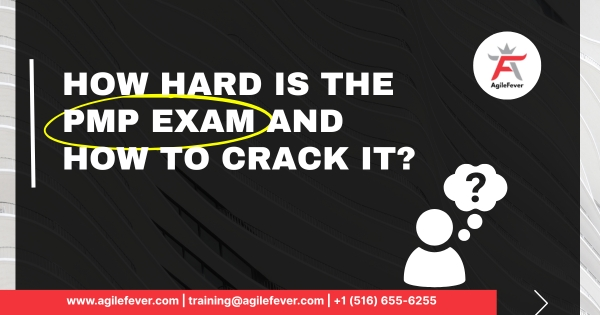Project management has become one of the most respected and essential skills in today’s business landscape. Whether you work in IT, construction, healthcare, or finance, the ability to lead projects effectively determines your career growth. Among the various global credentials available, the PMP certification from the Project Management Institute (PMI) is recognized as the gold standard for professionals who want to validate their project management expertise.
However, earning this credential is not easy. The PMP exam is known for its depth, scope, and application-based questions that challenge even experienced professionals. This blog explores how hard the PMP exam really is, why it feels difficult for many, and the proven ways to prepare and pass it confidently.
How Hard Is the PMP Exam?
The PMP exam is designed to test not just what you know, but how you apply project management principles across real business scenarios involving leadership, planning, and risk management.
The PMP exam is challenging by design. It evaluates not only what you know but also how you apply that knowledge in real-world project situations. You need to demonstrate leadership, analytical thinking, and decision-making across predictive, agile, and hybrid methodologies.
Many first-time test-takers underestimate the exam’s intensity. It requires around 200–250 hours of structured study and multiple rounds of mock practice to feel comfortable with timing and complexity. The key is to treat it as a professional milestone, not just another test.
Why the PMP Exam Feels Difficult
The difficulty of the PMP exam comes from its comprehensive content, scenario-based questions, and expectation of professional-level decision-making under pressure.
The challenge lies in integrating theory with practice. Candidates must interpret complex questions, understand project context, and respond as if they were managing real teams and stakeholders in dynamic environments.
Breadth of Knowledge
The syllabus includes everything from cost management and stakeholder communication to risk analysis and leadership principles. It tests your ability to connect these topics rather than study them in isolation.
Real-World Orientation
Questions mirror real project scenarios. You must pick the best solution based on PMI’s standards, not personal work habits.
Psychometric Scoring
There is no fixed pass percentage. PMI uses psychometric analysis to determine your result based on the exam’s difficulty level.
Time Management Challenge
You have 180 questions to complete in 230 minutes. Maintaining focus and pacing yourself throughout the exam is critical.
Modern Question Types
The exam now includes multiple-response, hotspot, matching, and fill-in-the-blank formats, making preparation for all types essential.
What Makes the PMP Exam Complex
The PMP exam’s complexity lies in its vast syllabus, dynamic structure, and the balance it demands between experience, conceptual clarity, and time-bound performance.
It is not a memory-based test. The exam challenges your ability to apply principles from multiple project management frameworks and methodologies in practical, situational ways.
Comprehensive Syllabus
The exam focuses on three main domains: People, Process, and Business Environment.
- People (42%) evaluates leadership, motivation, and conflict management.
- Process (50%) tests operational and technical project execution skills.
- Business Environment (8%) measures how well you align projects with organizational goals.
Exam Format
The paper includes 180 questions, both conceptual and situational. Managing speed and accuracy is crucial for a good score.
Eligibility and Experience
You must have verifiable leadership experience and 35 hours of formal project management education. Without practical exposure, interpreting situational questions can be challenging.
Study Materials and Preparation
Preparing for the PMP exam requires comprehensive reading, practical application, and regular mock testing to strengthen both understanding and performance.
Candidates who prepare strategically, use authorized resources, and stay consistent with their schedule have a significantly higher chance of clearing the exam on the first attempt.
Core References
- PMBOK® Guide (7th Edition): The official foundation for project management standards.
- Agile Practice Guide: Essential for mastering agile and hybrid concepts.
- Exam Content Outline (ECO): Defines domain distribution and core expectations.
Supplementary Resources
- Books by experienced professionals like Rita Mulcahy.
- Online courses from PMI-authorized training partners.
- Flashcards, podcasts, and community discussions for revision.
Practice and Simulation
Mock exams are vital for developing timing, confidence, and real-exam familiarity. Candidates consistently scoring 75–80 % in mocks usually perform well in the actual exam.
PMP Exam Structure and Format
Understanding the exam’s format and structure is crucial to building an effective preparation plan and avoiding surprises on the final test day.
The PMP exam includes 180 questions in 230 minutes, covering predictive, agile, and hybrid methodologies. You must master both content and time management to succeed.
| Parameter | Details |
| Total Questions | 180 |
| Duration | 230 minutes |
| Question Types | Multiple Choice, Multiple Response, Matching, Hotspot, Fill-in-the-Blank |
| Domains | People – 42%, Process – 50%, Business Environment – 8% |
| Methodologies Covered | Predictive, Agile, Hybrid |
| Scoring | Psychometric analysis (no fixed passing percentage) |
Taking full-length mock exams under timed conditions is the best way to get comfortable with the structure and pressure.
PMP Pass and Failure Trends
PMI does not officially disclose pass or fail rates for the PMP exam, which adds to the mystery surrounding its difficulty. However, industry estimates suggest that around 60 to 70 percent of candidates pass on their first attempt.
The success rate largely depends on preparation style, consistency, and familiarity with real-world project scenarios. Candidates who rely only on theory or skip mock exams often struggle, while those practicing regularly tend to perform significantly better.
How Long Does Preparation Take
Study time depends on your familiarity with project management and your availability. Experienced professionals who already apply PMI practices daily may complete their preparation in three to four months. For working professionals or beginners, five to six months is more realistic.
A simple timeline for preparation could look like this:
- Weeks 1–3: Build fundamentals and review PMBOK concepts.
- Weeks 4–9: Dive into detailed study, especially agile and hybrid models.
- Weeks 10–12: Take mock exams and track weak areas.
- Final Week: Focus on quick revision and rest before the test.
Consistency matters most. Even two hours of daily focused study over several months produces stronger results than cramming in the final weeks.
Strategy to Crack the PMP Exam
Cracking the PMP exam requires a clear plan, discipline, and a problem-solving mindset that aligns with PMI’s professional standards.
A structured and calm approach ensures consistent progress while reducing burnout. Here’s how you can build a winning preparation strategy.
- Start with purpose: Define why you want the credential and how it supports your career. A clear goal keeps you motivated.
- Choose an authorized training partner: PMI-approved programs follow the latest syllabus and provide mock tests that mirror the real exam.
- Create a consistent schedule: Dedicate time each day to study, practice, and revision. Break large topics into smaller, manageable parts.
- Understand, don’t memorize: Learn to apply concepts to real scenarios instead of rote learning.
- Take realistic mock exams: Practice full-length tests and review every question you get wrong.
- Build mental stamina: Train your focus with timed sessions and reduce distractions.
- Prepare for exam day: Sleep well, stay hydrated, and manage your pace during the test. Read carefully and choose answers that align with PMI’s project management approach.
Common Mistakes to Avoid
Even well-prepared candidates can struggle with the PMP exam if they fall into avoidable traps. Most failures are not due to lack of knowledge but because of poor planning, inconsistent practice, and misunderstanding the exam’s intent. The PMP test evaluates how you think and act like a project manager, not how well you memorize theories. Recognizing these common mistakes early can help you refine your strategy and improve your results.
Common mistakes include:
- Treating the PMP exam as a theory-based test instead of an application-driven one.
- Skipping mock exams or practicing only short quizzes instead of full-length simulations.
- Ignoring agile and hybrid concepts that form a significant portion of the exam.
- Spending too much time on tough questions, leading to rushed answers later.
- Failing to review incorrect answers and missing valuable learning opportunities.
Avoiding these errors ensures stronger preparation and greater confidence on exam day.
Expert Tips for Success
Practical study habits and smart strategies can make your PMP journey smoother and more effective.
Focusing on understanding rather than memorizing ensures lasting retention and better judgment under pressure.
- Use a combination of reading, audio, and video learning formats.
- Maintain quick-reference notes for formulas like CPI, SPI, and EVM.
- Revise regularly to keep concepts fresh.
- Always select answers that prioritize stakeholder communication and transparency.
- Join study groups for accountability and shared insights.
Conclusion
The PMP certification is one of the most recognized and respected credentials in project management. While the exam is undoubtedly challenging, it is absolutely achievable with the right strategy, consistent practice, and a clear understanding of project management concepts. Success depends on planning your study schedule, taking regular mock exams, and learning how to apply knowledge in real-world scenarios. To make your preparation smarter and more effective, join the AgileFever Masterclass. It offers live sessions, expert mentorship, and practical exam simulations that mirror the actual test experience. With guided learning and proven techniques, you can confidently pass the PMP exam on your first attempt. Visit www.agilefever.com to enroll and start your PMP journey today.
FAQs
Is the PMP exam very difficult?
Yes, it is challenging because it tests both theoretical knowledge and real-world application. Consistent preparation, mock exams, and practical understanding make the PMP certification achievable.
How many hours should I study for the PMP exam?
Plan for around 200 to 250 hours of focused study spread across three to five months, including mock tests, revisions, and active practice sessions.
What is the hardest part of the PMP exam?
Scenario-based questions are the toughest because they test decision-making skills, leadership mindset, and real-world project management judgment rather than simple memorization.
Does the PMP exam have negative marking?
No, PMI’s PMP exam does not include negative marking. You are encouraged to attempt every question to maximize your overall score potential.
How often can I retake the PMP exam?
You can attempt the PMP exam up to three times within one year of your application approval if you fail in earlier attempts.



